Have thoughts on trusting AI? This programme wants you to be part of the convo.

[This is a sponsored article with the National Libary Board.]
Raise your hand if you’ve recently used artificial intelligence (AI) to find an answer or make your work easier.
It’s undeniable that new technologies, especially AI, are becoming the norm in a world pushing towards automation and dependence on technology.
While AI has made it easier to complete certain everyday tasks, we have also seen instances where the technology has been used for harm. From deepfakes impacting elections and bots rewriting codes, these incidents have incited distrust and fear from the general public.
This got us wondering: How much do Singaporeans trust AI? What are their concerns?
Many reports have been released on Singapore’s sentiments on AI, including a recent study conducted by KPMG, which found that while 80% of Singaporeans accept AI, 55% are unsure or unwilling to trust the technology.
To dive deeper into the “why,” we asked three Singaporeans to share their thoughts on AI’s benefits and their concerns with how the technology is used. Here’s what they said.
What do Singaporeans think of AI?

As an undergraduate data science student, Saarvaneetha Sivakumar (Saarva), 20, is no stranger to AI. She shared that she uses the technology to verify answers or as a guide when she struggles with schoolwork.
Like many students, Saarva also runs her assignments through AI to get feedback as it identifies weaknesses in her work that she can amend accordingly. Despite these benefits, she is also concerned about the technology’s accuracy.
“I think AI still has a lot of flaws. Sometimes, you have to correct the AI because it gives you wrong answers,” said Saarva, adding that she questions how AI stores or uses the data she shared and is uncomfortable with her data being at risk of exposure.
When asked how she would feel if she were taught by an AI in school, Saarva immediately opposed the idea, pointing out that AI can be trained on biased data and perpetuate harmful stereotypes towards certain students.
Sasha Nicole Nair, 24, voiced similar privacy concerns, adding that she shops online at least three to four times a week. While she finds AI helpful for personalising recommendations and offering deals based on her interests, she’s cautious about how her data is collected and used.
“My biggest concerns are data misuse and third-party sharing as I don’t know how secure my personal and shopping data is, and I do worry about my data being sold or shared without my permission,” she added.
On the other hand, Nur Ubaidah, 29, a senior account executive, believes that it is safe to share her personal data to populate information to grow the database that the AI is using to serve medical patients better—as long as it is abiding by our laws and regulations.
She explained that AI could be beneficial when explaining complicated medical jargon in layman terms, preventing miscommunication between doctors and patients.
That said, Nur believes that human doctors should have the final say in diagnosing and treating patients and that the “only way” that AI can produce more accurate results is if data is accessed and used in a secure manner.
Do you share similar concerns but are unsure if you’re an AI advocate or AI averse? Try this five-minute quiz to see where you stand in this debate.
Understanding more about AI
Based on the responses we received, Singaporeans are not opposed to using AI in their lives. However, they remain sceptical and fearful about their privacy protection, which limits the depth of their understanding of the technology.
Acknowledging these concerns and potential implications, the National Library Board has collaborated with the Singapore University of Technology and Design (SUTD) to launch Catalyst.
It’s a programme that provides an open platform for Singaporeans to discuss how trust plays a vital role as AI becomes part of their everyday lives, and be a part of the conversation on how AI can be used more responsibly.
For tertiary students, younger working adults, and lifelong learners looking to learn more about AI and its benefits, you can participate in this free event and gain access to exclusive workshops specifically curated for participants.
Attendees will also get to network with industry leaders and like-minded peers, including representatives from NTU Centre for AI in Medicine, the National Institute of Education, and the Singapore Institute of Retail Studies, among others.
Catalyst will be held in three stages, with the first and second stages to be held from January 8 to February 15, 2025.
The first stage consists of three panel discussions focused on the impact of AI across three key sectors: education, healthcare, and retail. Attendees will participate in small group brainstorming sessions, applying what they have learnt to address various problem statements and gear up for co-solutioning in the later stages.
Participants can also attend a workshop conducted by Design.AI, where attendees can try using the platform to make AI-generated logos, videos, and more, with their free trial accounts.
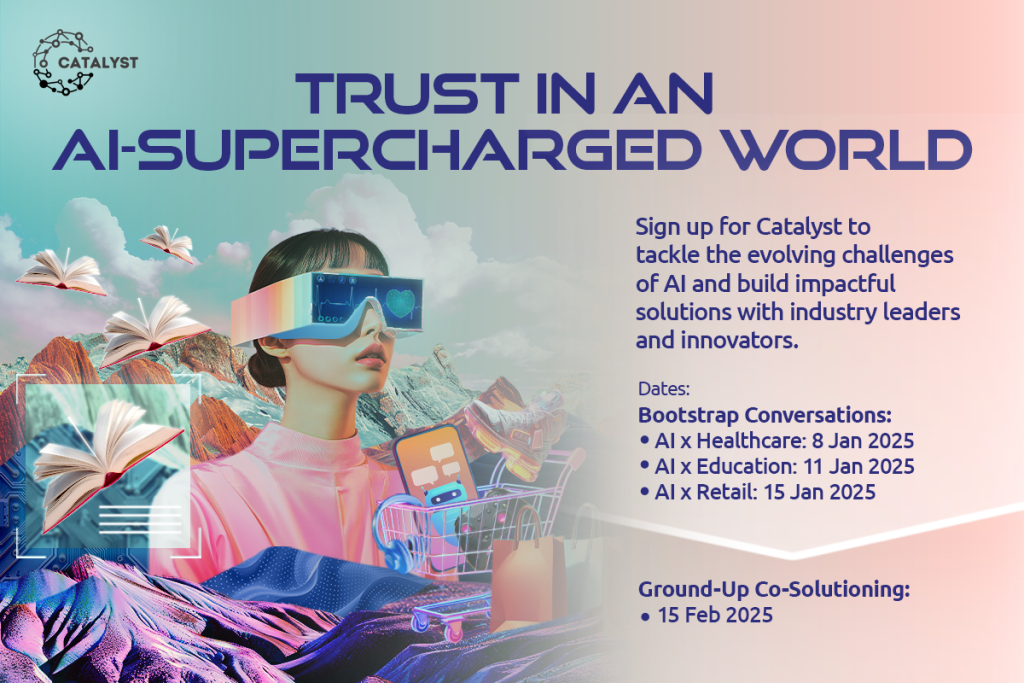
The second stage is a co-solution session, where attendees can collaborate with industry partners to ideate and pitch solutions to the challenges of AI and trust. They will also gain access to exclusive opportunities, such as a half-day tour of Google’s Singapore office and marketing workshops.
The third and final stage will be held separately from the event in March 2025, where attendees who participated in the co-solution session will join a 90-day sprint developing prototypes. Those in the programme will receive guidance through workshops and be mentored by industry experts, who will also provide feedback.
As technologies like AI evolve, you need to understand how AI could help you meet specific needs and your inclinations.
While it will be some time before the event is launched, you can learn more about the programme here and stand a chance to win S$20 GrabGifts vouchers by taking the aforementioned five-minute quiz by December 31, 2024, too!
- Learn more about Catalyst here.
- Read more articles we’ve written about Artificial Intelligence here.
Also Read: As AI becomes the norm, S’porean workers are honing these 5 skills to stay competitive
Featured Image Credit: Flickr
How these Singaporeans built a multi-million-dollar biz by manufacturing cleaning robots
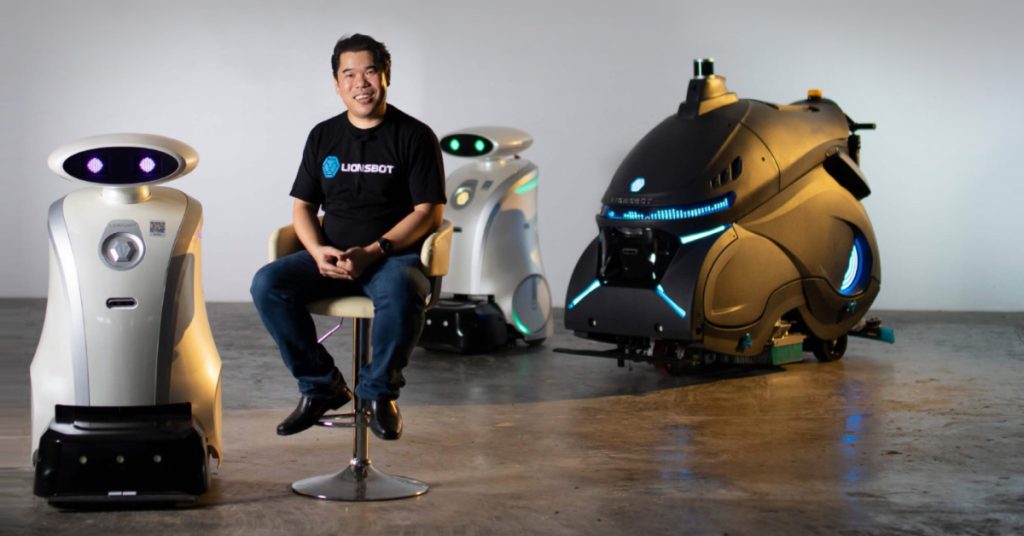
With the holiday season around the corner, many Singaporeans are gearing up for their year-end travels—and if you’re one of them, you might have spotted animated robots gliding around the airport, diligently cleaning the premises.
These innovative cleaning robots are not just limited to Changi Airport—they’re also hard at work at hospitals, offices and various other locations globally, including The Shard and Wembley Stadium in London, and Dubai’s Festival City Mall.
But did you know that these high-tech robots are proudly made in Singapore?
The mastermind behind them is LionsBot—one of the fastest growing companies in Singapore, ranking fifth in The Straits Times‘ annual list. Their story, however, began with humble roots.
Meet the founding team behind LionsBot

At the helm of LionsBot is husband-wife duo Dylan Ng and Michelle Seow, and Dr. Mohan Rajesh Elara, who joined the business later on.
Dylan first met Michelle during their university days, when he sparked a conversation with her by showing off his PalmPilot. Their entrepreneurial journey took shape when a friend approached them with an opportunity to sell steam cleaners on commission.
“We’re risk-takers and had nothing to lose,” said Dylan. “Being marketing majors and having studied selling dreams for a living, we wanted to start our own business.”
So the pair jumped in, unaware that this decision would set them on the path to building a multi-million-dollar cleaning empire.

After graduating, Dylan and Michelle pooled their entire savings of S$2,000 each to launch their first company—SuperSteam, a distributor of professional cleaning equipment and chemicals.
Determined to make it work, they conducted thorough market research, rehearsed their sales pitches, and began their journey with door-to-door sales demonstrations. Revenue trickled in sporadically, and each day brought its own challenges—hauling heavy equipment up flights of stairs, facing rejection, and pushing through exhaustion.
“We rented a van at S$50 per day, which was all the money we had, so we often skipped lunch to buy petrol,” Dylan said in an interview with CNA. At their lowest point, they had to relocate their operations from an office to Dylan’s mother’s garage.
Yet, with support from family, friends, and early customers, they pressed on. Eventually, Dylan and Michelle pivoted business their strategy, shifting their focus to commercial clients like food manufacturers instead of individual consumers.
This strategic shift paid off, and their business began to pick up—but it was during this time that they identified significant challenges within the cleaning industry.
One of the prominent issues was the shrinking manpower, coupled with an aging workforce, which was a trend not just in Singapore, but globally. We foresaw a sustainable solution in utilising autonomous cleaning robots that could assist the elderly workforce while also addressing the manpower crunch.
Dylan Ng, co-founder and CEO of LionsBot

With this goal in mind, they began exploring robotic solutions to offer their clients. It was also around this time that the government launched a new initiative to support automation, which further motivated them to take the leap into manufacturing cleaning robots.
“To our dismay, we couldn’t find something that precisely met our criteria,” shared Dylan. But as fate would have it, they soon received an unexpected phone call from a teammate of Dr. Mohan.
Dr. Mohan, an associate professor at the Singapore University of Technology and Design, had been researching intelligent cleaning robots for some time. His team had purchased one of Supersteam’s traditional cleaning machines and successfully made it semi-robotic.
Although it had been a prototype, the duo immediately recognised the potential of Dr. Mohan’s creation—it was the missing piece they had been searching for. By combining their expertise in cleaning solutions with Dr. Mohan’s robotics knowledge, LionsBot was launched in 2018.
“We couldn’t do everything for everyone”

With a team of five engineers, LionsBot developed their first prototype in just seven months. This may seem like a significant achievement, but Dylan pointed out that it was only the beginning for the company.
“It’s easy to create a prototype, but building a reliable product is much harder,” he explained. “The robot needs to operate day in and day out without any issues.”
Even when they got past that hurdle, LionsBot’s journey remained anything but smooth. “We were very happy for [our robots] to work in our office,” he recalled.
But when selling our products, we had to make sure it works in other people’s offices, buildings, and corridors—places you don’t always see. Every environment is different, even factors like shiny lights or reflective floors can create new challenges for the robots.
Dylan Ng, co-founder and CEO of LionsBot

In the early stages, their products required constant improvement, but they also faced challenges in determining where to focus their efforts.
“Everything seemed important. Maybe to close a deal for a customer, we had to make a special feature—but as we chased that, we realised that it might not be ideal for other clients,” shared Dylan.
At the time, many also had unrealistic expectations of what a cleaning robot could do. “Not a lot of people have seen their capabilities, so they expected the world from it.”
After making some “costly mistakes” and seeing their teams “burnt out,” they quickly learnt that prioritisation was crucial. “We couldn’t do everything for everyone—sometimes learning how to say no is important.”
LionsBot has sold over 2,500 robots to date
LionsBot has now “gotten the hang of things” after selling to “enough clients” and seeing real-world situations. “We know what works and what doesn’t,” said Dylan.
For example, the company eventually decided to phase out their LeoBots, which initially gained significant attention for their ability to sing, rap, and even speak Singlish.

“Singing and rapping are fun, and they were easy to do in English,” Dylan explained. “But it’s very difficult to execute in languages like Lithuanian, Estonian, Hungarian, and other diverse languages.”
Moreover, he added that some of his clients wouldn’t want the robots to speak, especially in quiet environments.
Instead of offering English-speaking robots, LionsBot’s robots now interact with people through a series of beeps, and come with digital displays that can convey certain human emotions. “Annoyance, rolling eyes—those are universal languages,” Dylan laughed. “It’s international.”

To date, LionsBot has sold over 2,500 robots to over 30 countries—and according to Dylan, their robots are now considered the “highest performing robots.” The company has also seen significant breakthroughs with AI, which has doubled their cleaning performance.
Although LionsBot has yet to turn a profit, Dylan hopes to double the company’s sales revenue to S$41 million this year and achieve profitability by 2025. A key step towards this is their newly launched S$12 million manufacturing facility in Kranji, which can quadruple the company’s production output compared to its older facility in Changi.
Looking forward, LionsBot is also eyeing another major milestone: to be listed on NASDAQ by 2027. “The decision to go public is driven by our growth trajectory and the need to enhance our credibility on a global scale,” Dylan explained.
Currently, the company is focused on key markets in Europe, the USA, as well as developed markets in Asia, including Australia, South Korea, Japan, and Singapore.
“As we grow in these markets, we need more local support and deeper market penetration. Going public will provide the necessary resources to seriously develop each market and continue our expansion.”
Also Read: At 23, he acquired Swee Lee. Now, this billionaire’s son is building his own music empire.
Featured Image Credit: Lionsbot
Tony Fernandes said these 5 things were AirAsia’s biggest assets for growth

Say what you want about AirAsia and Tony Fernandes, but it’s hard to deny that he’s built a company with solid branding and a strong company culture.
He’s grown Capital A’s portfolio from one airline brand to span seven core verticals—aviation, logistics, engineering, aviation services, digital lifestyle services, fintech, and even brand management.
And I’m sure many of us are familiar with their AllStars.
Personally, I’ve never had the opportunity to listen to Tony speak at business events, so I was anticipating his keynote speech at MRANTI’s I-Nation 2024.
Glad to say, it didn’t disappoint.
While I can find all sorts of analyses and theories online on what drove AirAsia’s growth, it’s not the same as hearing it from the horse’s mouth.
Here’s what Tony said has been AirAsia’s biggest assets for growth.
1. “The number one asset in your company is your staff.”
Employers worth their salt will know this. In the service industry, this is all the more important, as happy staff usually mean happy customers too.
This isn’t to say that layoffs don’t happen at AirAsia, nor can we forget how the 2021 F-bomb controversy was initially handled.
But in many cases, AirAsia also tries to retain its staff where it can, moving them to positions that fit them better. Vulcan Post covered one such example of this in 2020.
And Tony shared that they continue to do so, with dispatch riders becoming first officers, ramp officers becoming data analysts, and cabin crew becoming captains and even flight instructors within the company.
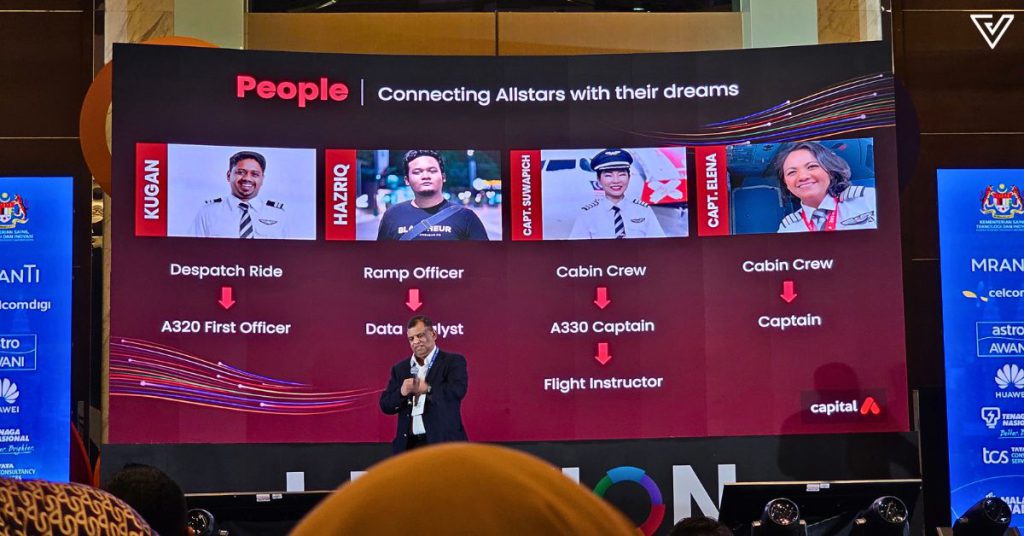
2. A firm belief in the saying “data is king”
According to Tony, he didn’t foresee the data revolution. He simply wanted to know his customers better and alleviate their pain points while travelling. So he looked at the data, and it showed him only 6% of Malaysians were flying at the time.
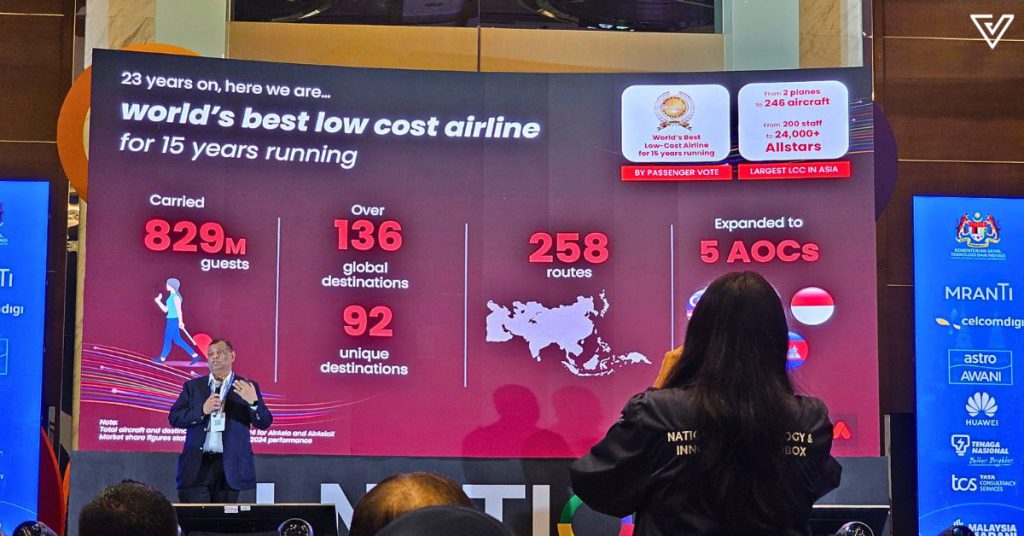
That’s how AirAsia came to be, allowing more Malaysians to enjoy the perks of low-cost flying. Similarly, during the pandemic, when planes were grounded, Tony saw another opportunity when he learnt that only a low percentage of Malaysians were using courier services.
If AirAsia was able to make the service more convenient and accessible, just like they did low-cost flights, demand would grow. Combined with the extra cargo space they had while planes were grounded…
Boom, Teleport was born, and it grew into a US$50 million business in two years. Next year, they hope to achieve five million parcels shipped per day. They also started a courier service that’s already expanded to Singapore and is eyeing Thailand next.
3. A good, big pool of funds for branding
Tony’s a firm believer in putting money into making sure his brands stand out.
This has led to the success of Santan, their in-house F&B brand that got popular enough in the skies that they brought it down to the ground too.
They even opened restaurants under the brand, though those have since closed.
To do successful branding, you’ll need to know what your brand stands for. “If your staff don’t know your mission, how can you sell it outside?” Tony said.
4. A will to disrupt
In 2019, Tony made a huge decision. It was one that upset even his team.
He turned their airline website into an online travel agency (OTA). This meant that AirAsia’s website would actually be selling flights from other airlines, listing hotel stays that weren’t Tune Hotels’, and more.
It was a bold move, and a big risk. But he saw how people were gravitating towards sites like Booking.com and Trip.com to plan their holiday, and knew that he had to disrupt AirAsia’s status quo.
They couldn’t stay stagnant. “If you’re not ready to change, you’ll die,” he said.
True enough, that was the right move for them, allowing them to grow beyond just an airline into a digital and travel lifestyle brand, offering users e-hailing, food delivery, parcel delivery, fintech services, and more.
And he’s not done disrupting the industries they’re in yet. As a teaser at I-Nation 2024, he shared that he wants to launch loan products under BigPay, and possibly create a token or a stablecoin that can be used across Asia.
5. Innovation that comes in many forms
Perhaps some entrepreneurs get too tied up over how to bring innovation to their companies, thinking that it has to be related to mind-blowing tech.
“Innovation is more than tech, it’s about your roots and your core, how you manage your company, your people, your products,” Tony shared.
An example of innovating your products is how AirAsia introduced a direct flight from KL to Nairobi, something that Tony said has never been done before.
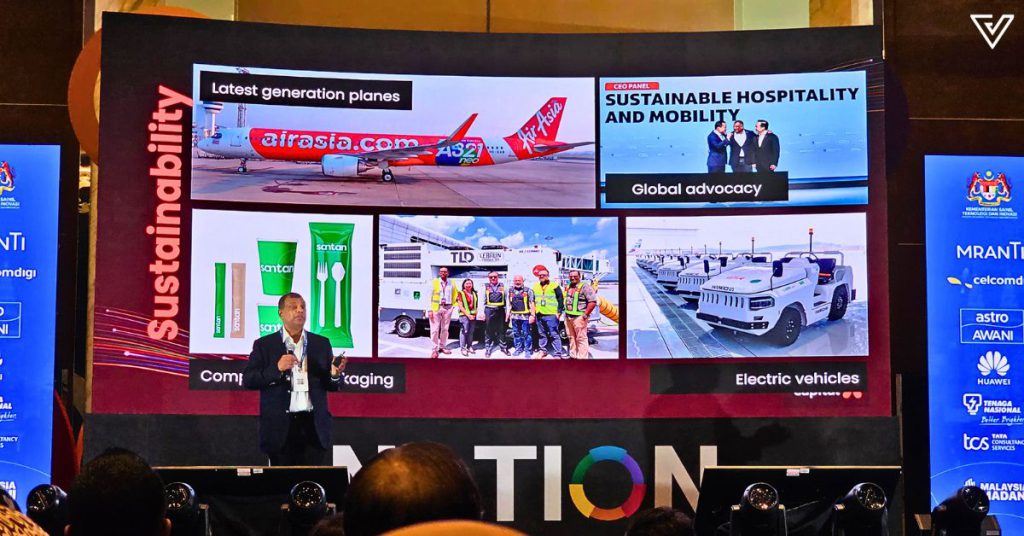
Doing things differently is also a form of innovation, the entrepreneur said, such as allowing their cabin crew to wear their hair however they want, and investing in the growth of female pilots (they have one of the highest ratios of female pilots and engineers in the region).
-//-
If there was one big takeaway I had that day, it would be that AirAsia didn’t get to where it was by being meek with marketing.
Even at I-Nation, Tony didn’t neglect showcasing his charismatic marketing skills.
Mid-speech, he singled out an audience member. The reason? She was wearing red, which is, of course, AirAsia’s primary colour.
For that, Tony gave her two free seats on an AirAsia flight of her choosing. Whether she was a planted audience member (I don’t think so) or if the free flights will have strings attached, I don’t quite know.
Regardless, Tony probably gained a few more admirers in the crowd then and there, and AirAsia the brand will linger in the audience’s minds for a while longer, potentially sneaking into their holiday plans too.
- Read more Malaysian startup stories here.
Also Read: Mega sales are coming up in M’sia, here’s how to ensure that your parcels don’t go missing
Why this M’sian opened a holistic wellness centre in KL that combines 3 medical methodologies

[Written in partnership with RENN Asia Wellness, but the editorial team had full control over the content.]
For many, it may seem natural to get aches and pains as you age. Health disorders like hypertension and sugar problems aren’t exactly shockers when you’re older.
But for Jonathan Chew, this mindset has never made sense. Surely, he thought, there was a solution out there.
“It’s ridiculous that there is no way to fix it, and that we have to live with it, or we have to live through our golden age suffering from these health disorders,” he mused.
“And worse, for certain people, they have to spend their life savings trying to fix their health problems, but end up not even having any solution at all.”
It’s this thought that pushed him to start searching for solutions. And he found his answer to better health and wellbeing in evidence-based, personalised natural holistic therapies—something that can be found at his place of business, RENN Asia Wellness.
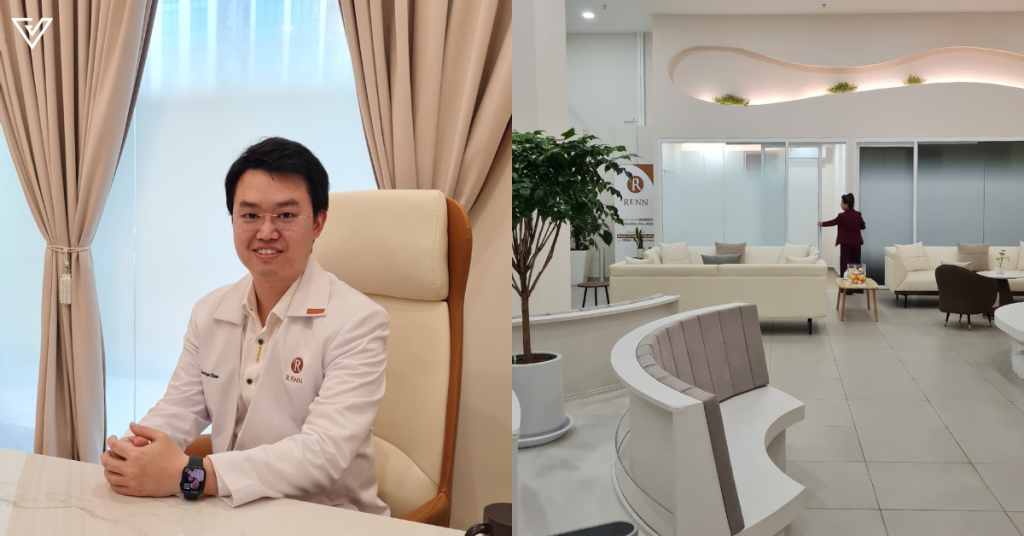
In the works for a decade
With a built-up area of approximately 8,500 sq. ft., RENN Asia Wellness can be found at the Vivo Retail Block of 9 Seputeh mixed development just off Old Klang Road in Kuala Lumpur.
Going into Jonathan’s office, you’ll get to familiarise yourself with his accolades and qualifications lining the four walls.
Graduating with a bachelor’s in medical bioscience from Monash Malaysia, Jonathan later got his professional qualifications from The Association of Nutritional and Functional Medicine Practitioners Malaysia, his anti-ageing fellowship from the US, and his Master’s from the University Yayasan Pahang.
Not one to stay stagnant, he’s also now in the final stages of obtaining his second Master’s from the University of Surrey.
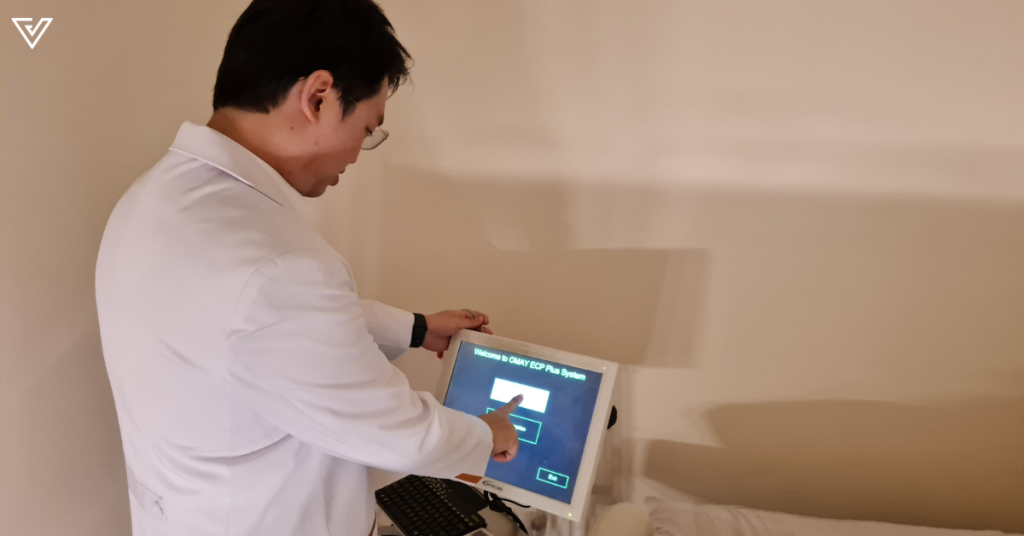
His foray into natural and complementary medicine started under the tutelage of Dato’ Sri Steve Yap at DSY Wellness and Longevity Centre in Ampang in 2013 upon graduating from Monash.
Back then, complementary medicine was practically unheard of. A pioneer in the local scene, Jonathan said Dato’ Sri Steve Yap brought nutritional medicine from the UK into Malaysia and developed it into a stronghold of complementary medicine locally.
Working with him has greatly shaped Jonathan’s career.
“The concept of RENN Asia has been inside me ever since the beginning, and with more exposure, experience and clinical cases, the feeling and desire have grown stronger,” he said. “I could easily say that this concept of RENN Asia has been brewing for almost 10 years.”
And now, in a post-pandemic world, it seems to be the perfect time to start. COVID-19, Jonathan believes, was a wake-up call for everyone to stop taking our immune system for granted.
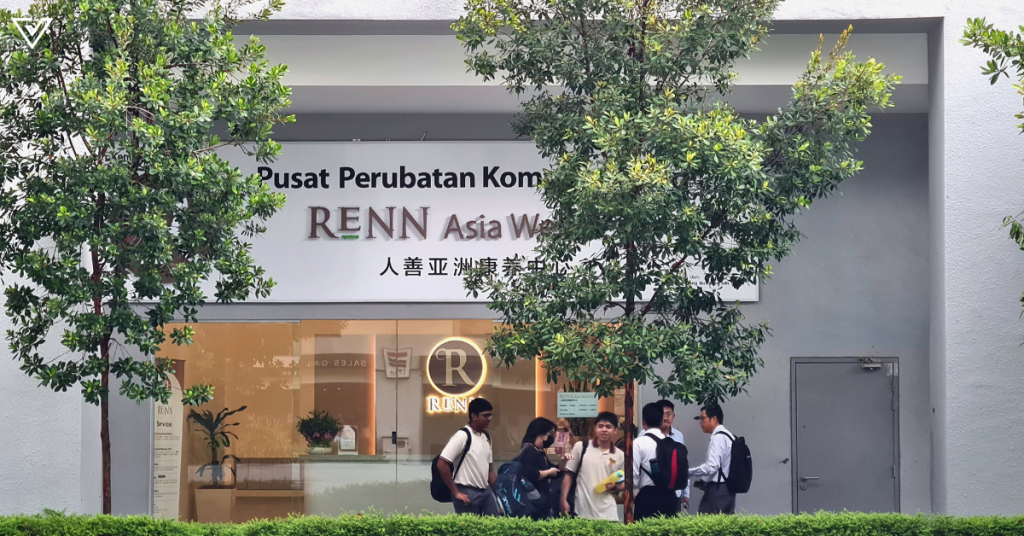
Bootstrapping the capital, Jonathan proudly opened the doors to RENN Asia in early 2024.
Bringing together different schools of medicine
But what’s so different about RENN Asia compared to your typical clinic, physio centre, chiro practice, or TCM spot?
Well, it’s the fact that it combines them to offer a well-rounded solution. But bringing different practitioners together is challenging.
“This is quite different compared to hospitals; though they have many different specialties, they all come under the same school of teaching or books,” Jonathan explained.
“But in RENN Asia, we are doing something that the public has not seen or heard of before by combining the three major medical modalities such as complementary medicine, conventional medicine as in physiotherapy, and traditional medicine.”
Conventional medicine refers to the common type of medicine in the Western world, practised by your typical doctors. Complementary medicine refers to the majority of other treatments that aren’t part of mainstream healthcare. Meanwhile, traditional medicine has roots in different cultures and beliefs, such as traditional Chinese, Malay, or Indian medicine.
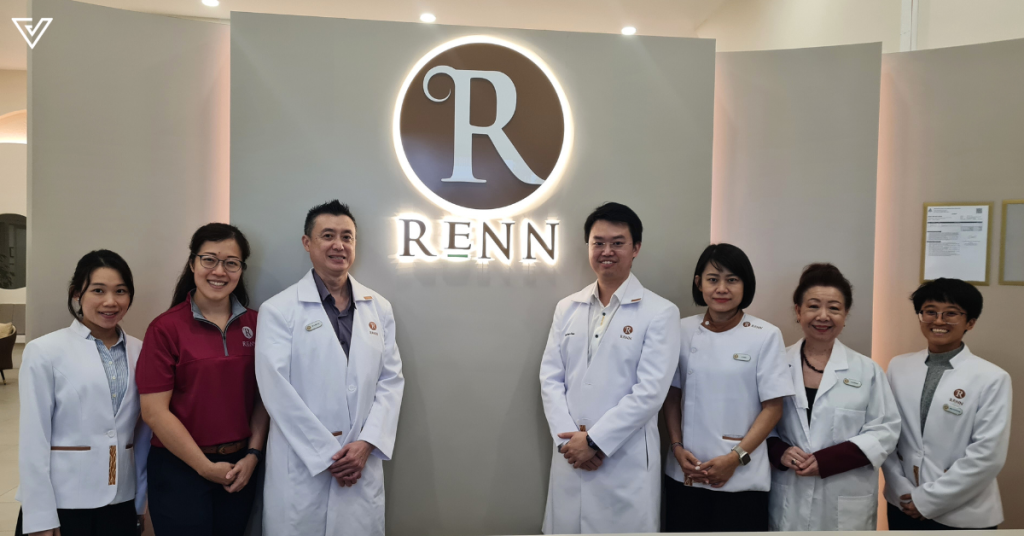
To get the right team members, Jonathan weeded talents through careful selection. Although the medical skills and knowledge of the practitioner are crucial elements, he focused on their mindset.
Practitioners who work in RENN Asia must be progressive, open, and collaborative in mindset. Jonathan believes that these fundamentals are required to ensure the whole team’s cohesion.
“History has taught us that without working together, no matter how strong the business is, it will eventually crumble,” he said. “Hence, to be able to achieve business longevity and sustainability, we need a cohesive and collaborative team.”
They now have 21 team members, comprising:
- Two nutritional & functional medicine practitioners
- One functional medicine doctor
- Two physiotherapists
- One TCM practitioner
- One nursing practitioner
- Four nutritional therapist/nutritionist/dietician
The others are administrative and back-end support and operations teams.
Accelerating forward
So far, things have been good for RENN Asia. Jonathan claimed that business developed in such a way that their plans for the second year were executed within six months of opening because of unexpected demand.
“We can report that first-year revenue has been satisfactory and we expect double-digit percentage growth for the next two years,” he claimed to Vulcan Post.
Although business is going well, many in Malaysia still aren’t aware of their range of treatment and protocols. In fact, the whole concept of wellness centres is still quite lacking.
“Perhaps awareness level is low because complementary medicine is still a fairly new medical modality in Malaysia,” he mused. “Regulations on complementary medicine have not been fully enforced yet.”
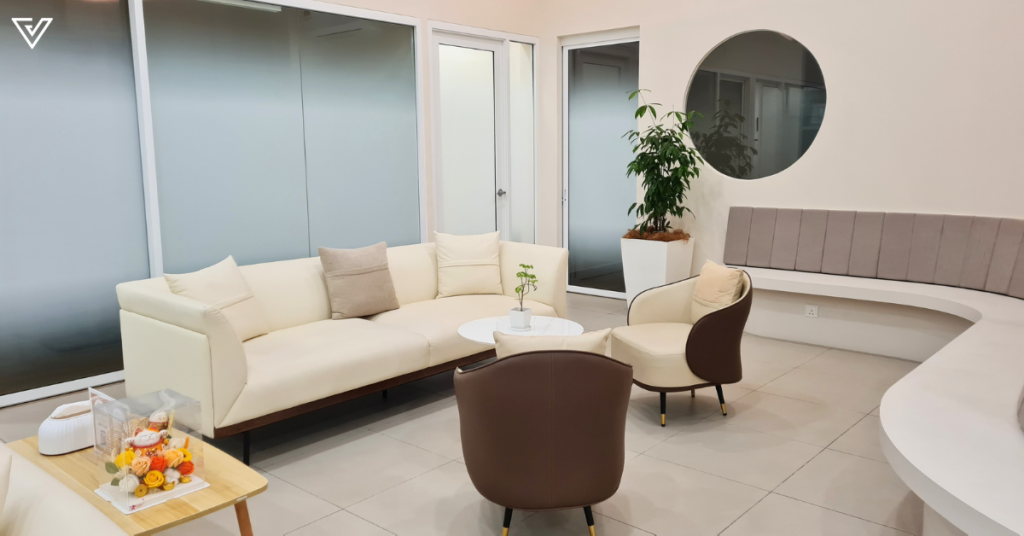
By regulations, he’s referring to the Traditional and Complementary Medicine Act. When fully implemented, modalities covered including Nutritional Medicine would be available in government healthcare settings and public tertiary education institutions. At the same time, it’ll be covered by insurance.
Even then, though, there may still be sceptics. To that, Jonathan believes that it comes down to open, honest conversations.
“In medicine, it is not a belief system but rather pure science,” he determined. “Hence, by providing the latest available evidence, most sceptics would be convinced.”
Keeping prices on the lower end
The founder believes that RENN Asia has been very well received by both members of the public and the medical community due to the innovative, holistic, personalised, and evidence-based therapies offered.
On top of that, they also focus on offering these solutions at a reasonable price.
“Balancing profitability while keeping bills affordable for clients is a deliberate choice for us,” he said. “It is not an easy decision but we do it to keep to our goal of making our solutions accessible to more people.”
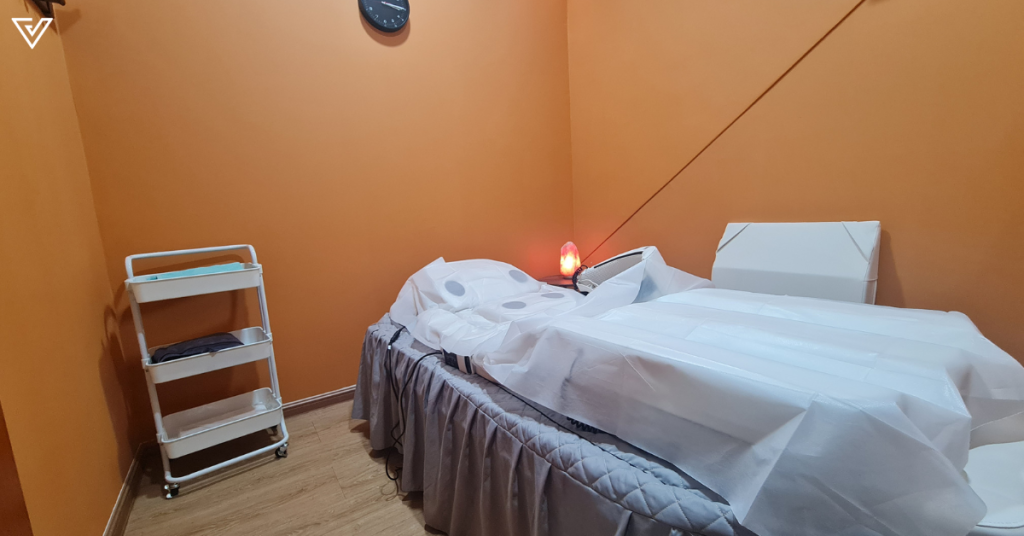
Compared to other centres, which are dependent on a singular stream, RENN Asia has dozens of revenue streams that all contribute to the overall income. And each modality contributes to the overall synergy of the centre.
Through this model, they are able to price certain offerings more affordably than others.
Going international
With solid footing right now, RENN Asia’s main focus is to mature the RENN Asia ecosystem.
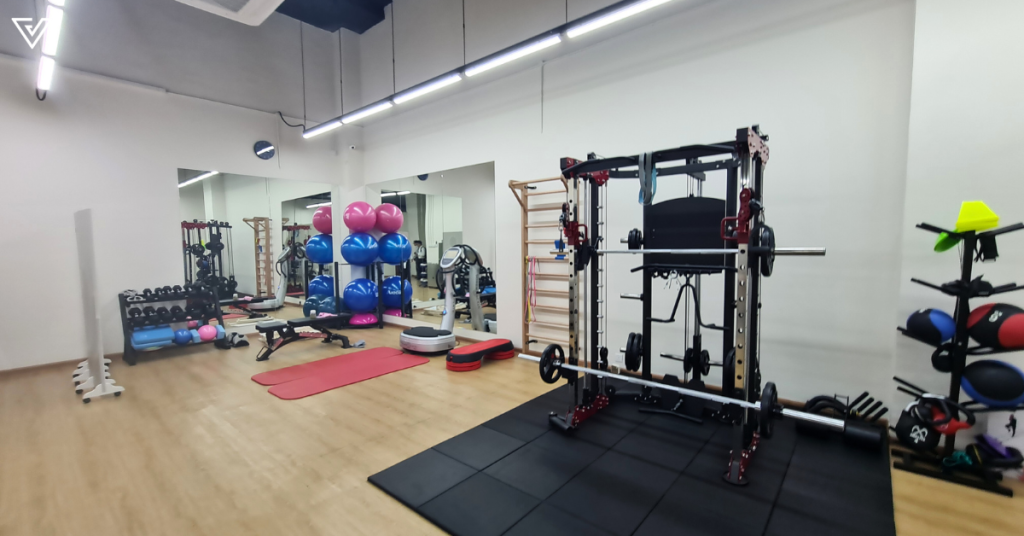
“With a strong client-based focus, we will start working on our entire wellness ecosystem, which includes a wellness café, book café, wellness clubs, wellness community, functional fitness, beauty and anti-ageing, and organic retail shops,” Jonathan added.
Ultimately, the idea is to bring the RENN Asia model across major cities globally, beginning with Asia before spreading their philosophy and influence worldwide.
- Learn more about RENN Asia Wellness here.
- Read other articles we’ve written about Malaysian startups here.
Also Read: Mega sales are coming up in M’sia, here’s how to ensure that your parcels don’t go missing
How this chef uses his internet virality to grow his authentic halal Italian restaurant in S’pore
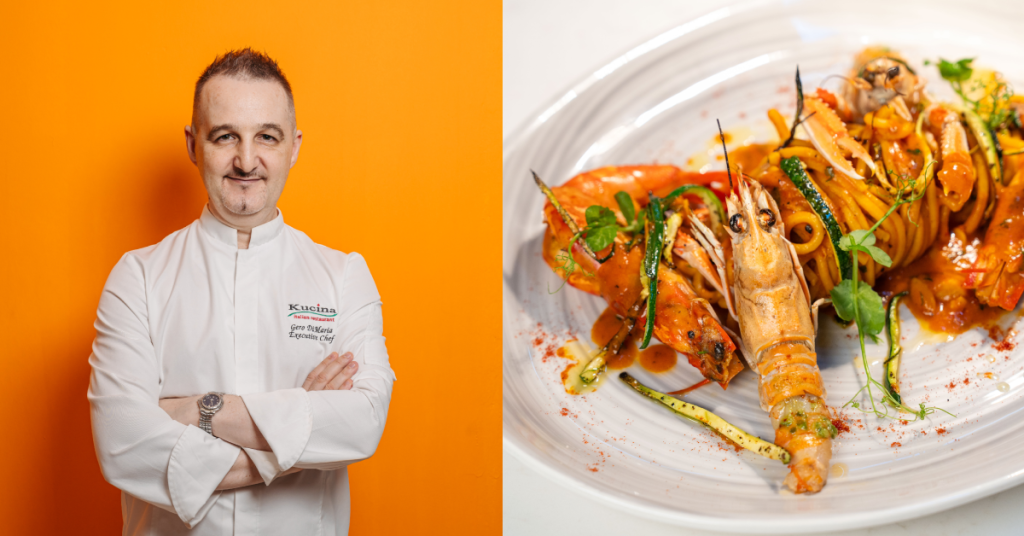
Ever enjoyed your holiday in a country so much that you harboured the desire to settle down there? That was the case for then-21-year-old chef Gero DiMaria when he visited Singapore in 1996 and decided to search for a job in the local F&B industry.
“Coming from the UK, Asia is very different, and I wanted to try something new and different. I always knew I would try to work in other countries, but I didn’t expect to end up here in Singapore,” he added.
Born to an Italian family in London, England, Chef Gero’s first stint in food was as a part-time dishwasher at an Italian restaurant at the age of 15. He then climbed up the ranks, working at several F&B establishments in the UK before moving to Singapore.
He first worked at the Italian restaurant chain Pasta Fresca and several other restaurants before starting Kucina in 2016, touting it as an “authentic Italian halal restaurant.”
Making Italian food halal
Since becoming Muslim in 2001, Chef Gero shared that he was frustrated with Singapore’s lack of halal options, especially regarding Italian cuisine.
Despite being hesitant to start on his own due to cost and manpower concerns, he turned his frustration into a personal drive. He said he invested S$130,000 with his business partners to open Kucina.
While it might seem “easy” to remove pork and alcohol, changing the recipe of certain dishes, such as the Carbonara and Sicilian Cannoli, became more challenging than expected.
In particular, Chef Gero shared that he spent three months in R&D for his cannoli dessert and “almost gave up” as he couldn’t achieve the right texture. “But in the end, I managed to get it perfect.”
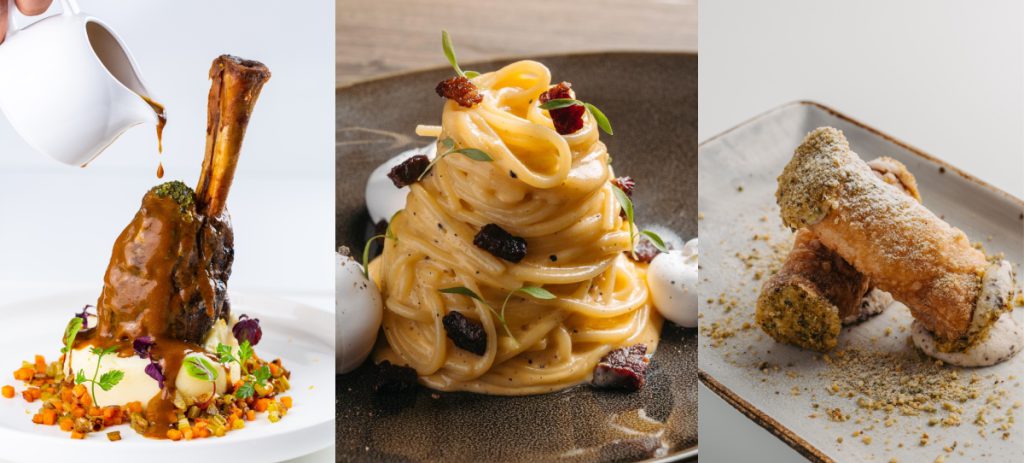
The concept of “authenticity” is often debated in the F&B industry, and for Chef Gero, it meant using cooking techniques that are the core of the flavours. He shared that while his restaurant was well-received, he had to educate his customers on his offerings.
“I had to teach the customers about real Italian food, as what they had previously was not authentic,” he explained.
We may be halal but the way we cook and the flavours are true Italian, I grew up with Italian cooking everyday so I know what is authentic or not, so this is my principle in cooking. I believe in comfort food and childhood memories, at the end of the day we always go back to our mum’s cooking.
This is what I do at Kucina and I do not deviate.
Chef Gero DiMaria, Managing Director, Executive Director and founder of Kucina
Growing the business beyond Internet hype
While some F&B establishments grew their reach through social media reviews, Chef Gero went old-school with his marketing strategy, relying on word of mouth.
He explained that his main challenge when he opened Kucina was staying on budget, leading him to purchase 95% of his kitchen equipment second-hand and not spend a single cent on marketing.
“[Word of mouth] takes longer, but it builds a better community and loyal customers. We didn’t spend any money on marketing for the first two years,” added Chef Gero.
He eventually enlisted the help of marketing companies to increase his reach and was exposed to various opportunities, from winning awards to catering for the annual National Day Parade from 2020 to 2022, and even cooking for the former president of Singapore, Madam Halimah Yacob, at the Istana.
In 2022, he hopped on the TikTok bandwagon, creating informational videos on authentic Italian halal cuisine. It was not long until he first went viral for his Aglio Olio cooking tutorial, and his Internet popularity grew with each video posted.
Since going viral from his educational videos on social media, Kucina saw a 30% to 40% increase in monthly sales, and their Instagram and TikTok pages amassed 281,000 and 269,400 followers, respectively, at the time of writing.
Chef Gero shared that he gets recognised everywhere he goes, even overseas, and is aware of the influence that he now holds with the large following he has gained. He has since launched another Instagram account documenting his health and fitness journey.
I have a lot of influence over millions of people, so I make sure everything I say and do is for them. Over the past year, I have realised that my content changes spending habits and food choices, so I want to always make it simple for my followers and give them my best.
Chef Gero DiMaria, Managing Director, Executive Director and founder of Kucina
Kucina has also undergone a revamp with its new private dining concept, Kucina Privato, to expand the restaurant’s capacity as the business grew along with the request for private events, such as weddings and corporate events.
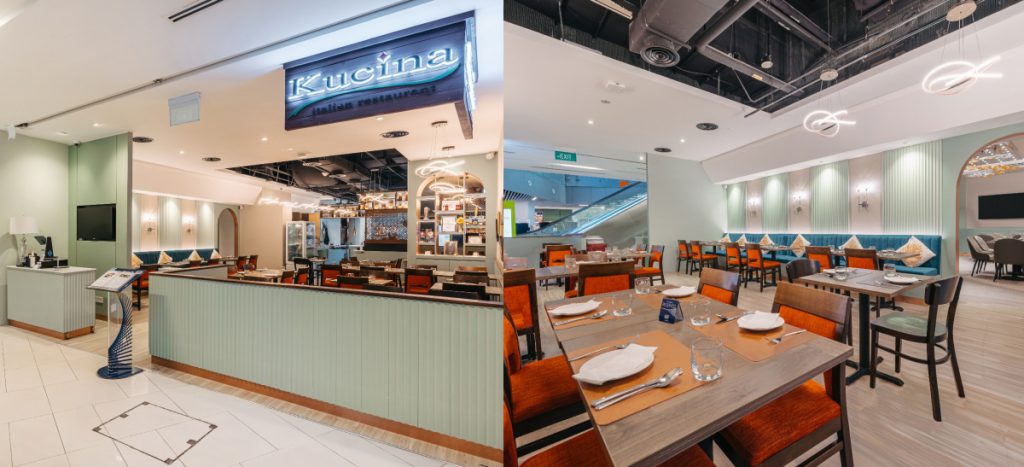
The restaurant has also launched a retail arm, Kucina Retail, following Chef Gero’s Internet popularity and brand collaborations, including Cold Storage. Its product offerings include packaged pasta, sauces, and butter, currently only sold to walk-in customers.
Aside from keeping their dishes affordable in light of rising food costs, Chef Gero has also introduced regional menus, with their Puglia menu introduced in September. “This is to showcase what real Italian food is by region as this changes drastically from each area.”
Looking forward to 2025, Chef Gero is working on a series of new plans, including a new menu and a cookbook. He also looks forward to “giving back to his strong Malaysian following” next year.
He also plans to “bring nostalgia back” to Kucina, but fans will need to keep their eyes open to what he means by that.
Also Read: How this S’porean duo grew their bakery from beyond the home kitchen to 3 outlets & a cafe
Featured Image Credit: Kucina